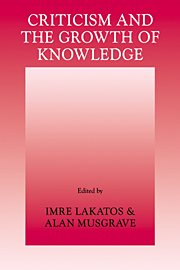 Criticism and the Growth of Knowledge
Criticism and the Growth of Knowledge Published online by Cambridge University Press: 05 August 2014
I
A few weeks ago I was asked to reply to Professor Kuhn this afternoon. Feyerabend and Lakatos were to have given the other papers; but the first could not come and the second found that, in arranging this colloquium, he had brought into existence a many-headed monster attending to whose multiplying demands would keep him busy approximately twentyfour hours a day.
This unexpected invitation made me very happy. Kuhn enjoys a unique position in the English speaking world as a philosophically-minded historian and historically-minded philosopher of science. I felt that it would be a privilege and a pleasure to reply to his paper.
For Kuhn, however, the programme change was not so agreeable. He had expected that Feyerabend and Lakatos would write independent papers so that his own would not need to be ready until this afternoon. Now he found that I was to reply to his paper, which rather suggested that I should see it beforehand. He responded heroically, rushing bits of his paper across the Atlantic as they left his typewriter. During much of last week I felt like a reader of a cliff-hanging serial, eagerly awaiting the next instalment. Thus my own paper has been written in a rush; and this has, I fear, aggravated my tendency to wave aside details and qualifications in trying to come to grips with someone's ideas.
To save this book to your Kindle, first ensure no-reply@cambridge.org is added to your Approved Personal Document E-mail List under your Personal Document Settings on the Manage Your Content and Devices page of your Amazon account. Then enter the ‘name’ part of your Kindle email address below. Find out more about saving to your Kindle.
Note you can select to save to either the @free.kindle.com or @kindle.com variations. ‘@free.kindle.com’ emails are free but can only be saved to your device when it is connected to wi-fi. ‘@kindle.com’ emails can be delivered even when you are not connected to wi-fi, but note that service fees apply.
Find out more about the Kindle Personal Document Service.
To save content items to your account, please confirm that you agree to abide by our usage policies. If this is the first time you use this feature, you will be asked to authorise Cambridge Core to connect with your account. Find out more about saving content to Dropbox.
To save content items to your account, please confirm that you agree to abide by our usage policies. If this is the first time you use this feature, you will be asked to authorise Cambridge Core to connect with your account. Find out more about saving content to Google Drive.